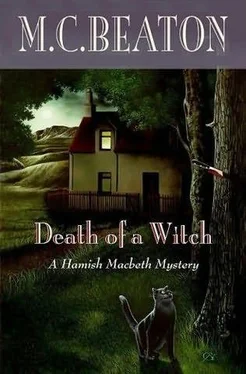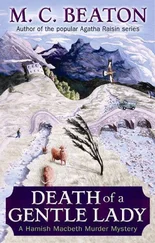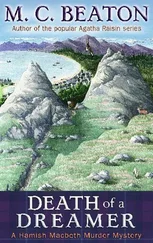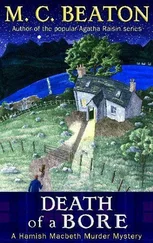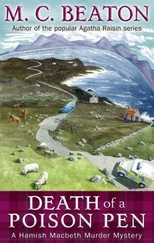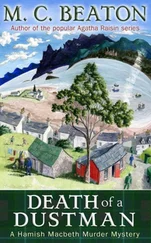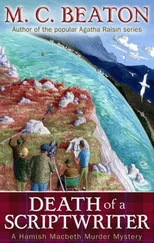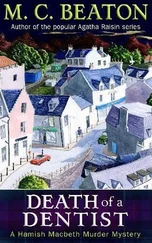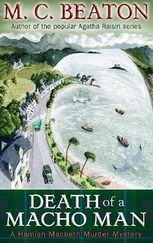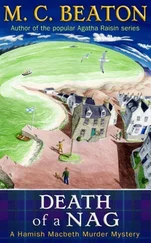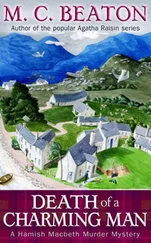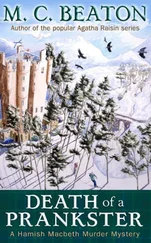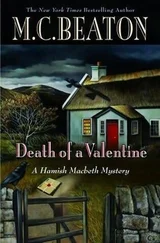“I doubt that,” said Hamish bitterly. “Coffee?”
“Grand. This is Perry Gaunt, a feature writer. And your coffee’s foul.”
“I’ve got round to using the percolator and I’ve got some decent stuff. Should be ready by now.”
Perry followed them into the kitchen. He looked around. There was a smell of peat from the stove and the aroma of fresh coffee. The round kitchen table was covered with a red-and-white gingham cloth, a present from the Italian restaurant, and gingham curtains hung at the window. Outside, the sun shone as if the Highlands had decided to give the residents a brief respite from winter.
Hamish poured mugs of coffee and then set a plate of shortbread on the table.
“I’m glad you’ve got company, Elspeth. I’ve been worried about you not being guarded.”
“Why should she be guarded?” asked Perry.
Hamish told him about the horoscopes. “Now, there’s a story!” exclaimed Perry.
“No, it’s not,” snapped Elspeth. “You should know I’m not supposed to write anything at all, other than for the Bugle . I can’t even translate Euripides in my spare time. Hamish, surely Fergus didn’t kill his wife.”
“The latest is that he sneaked out of work for two hours around the time his wife was killed and he absolutely refused to say where he was. Blair charged him with her murder, but there isn’t a single bit of evidence against him. The forensic team’s up at the back taking his place apart, looking for a weapon. He’s got money from his wife’s insurance so when they eventually allowed him a lawyer, he called in Agnes Dunne from Inverness. She’ll soon have him out on bail. She’s a terror. I wanted to investigate further but Blair found I had a lot of holiday time owing and he found some regulation that I had to take at least a week. I’m losing heart, Elspeth. I’m weary. Let me know if you get any ideas.”
“Right,” said Elspeth. “I’ll start by taking Perry here over to Braikie.”
“If you dig up anything, let me know.”
♦
Elspeth stopped the car on the shore road outside Braikie. “You see those houses?” she said.
“Yes, all boarded up.”
“The tide’s got higher every year. At high tide, this road is flooded. You can see where it’s being eaten away. A lot of the coastal villages are suffering but no one does anything. You could maybe put in a bit about that. You know the sort of thing – it’s not only a murderer in their midst that the people of Sutherland dread, but another enemy that is taking away their homes yaddity ya.”
“Got it.”
Elspeth drove on to the main street and parked. “I’m hungry. There’s a chippy. We could have fish-and-chips or haggis-and-chips or black-pudding-and-chips or…”
“Deep-fried Mars bars?”
“Of course. And deep-fried pizza, too.”
“You know,” said Perry, “the average life span of a man in Glasgow is now fifty-seven, and they put it down to a diet of the stuff you’ve just mentioned. I want a drink. What about The Highlanders Arms over there?”
“They’ve got meat pies from the bakery that aren’t bad.”
“We’ll try that and you can tell me all about the dead postmistress.”
♦
Perry had been damned in the Glasgow office as a ‘posh git.’ But Elspeth found his manner of listening intently, his light accent, and his very green eyes intriguing. One read a lot about people with green eyes in books, particularly American books. Maybe green eyes weren’t so unusual in the States, but it was rare to see such vivid green in Britain that was not pale or mixed with brown. Her mind turned briefly to Hamish. He blew hot and cold and anytime they seemed to be getting close, he always turned away to some other woman, usually Priscilla.
“Do you really think these murders are connected?” Perry asked.
“I’m not so sure about the one at Bonar Bridge. But the others, yes. Catriona Beldame was hated, Ina probably knew something, and the silly postmistress bragged that she did.”
“Do we still write postmistress or do we have to write postperson?”
“God forbid! Mind you, mere’s probably some new name like post office executive manager, or something. Ellie lived above the shop. Let’s go round there and see if some relative is cleaning up, someone she might have said something to.”
“You’re doing Hamish Macbeth’s job.”
“No, I’m doing my own. I’m a reporter, remember? You haven’t eaten your pie.”
Perry looked round the dismal dirty pub. “I’m frightened to.”
“If this frightens you, some of the places in Glasgow will scare your socks off. Come on.”
♦
Elspeth found the street door leading to Elbe’s flat standing open. They went up the stairs. The flat door was open as well. A small woman was standing in the living room putting stuff into a packing case.
“Excuse me,” said Elspeth.
The woman straightened up. She was wearing a floral pinafore over a dun-coloured sweater and dark blue polyester slacks. She was small and wiry with a pug face and grey hair.
“What do you want?”
“We’re from the Daily Bugle …”
“Sod off.”
Perry moved in front of Elspeth. “I know it must distress you to be approached by the press at such a time. But I think Miss Ellie Macpherson should be remembered not as a murder victim, but as a real, live person.” He gave his charming smile. “More to the point, you seem to have a lot of work and we could help you.”
She looked up at him for a long moment and then to Elspeth’s surprise, she smiled, exposing a set of daz-zlingly white dentures. “I could do with the help. I’m Betty Macpherson, Ellie’s sister. Wouldn’t think so, would you? She was aye a great beanpole o’ a lass.”
“I am Perry Gaunt and this is my colleague, Elspeth Grant. Maybe we could make you a cup of tea. Then you can take a rest and tell us what to do.”
“You’re right kind for an Englishman,” said Betty. “Tea would be nice.”
“I’ll get it,” said Elspeth.
When she returned from the kitchen with the tea things, Perry was on his knees, packing china ornaments. “I don’t want any of her stupid books,” said Betty. “Witch indeed. I don’t want that crystal ball, either.”
Elspeth poured tea into mugs. Then she picked up the crystal ball and gazed into it. “Someone would pay you for this,” she said. Suddenly she was engulfed with a wave of hate, fear, and anger. She dropped the ball on the carpet, where it rolled over to Perry. He looked curiously at Elspeth’s white face. “What is it?”
Elspeth shook her head as if to clear it. “Nothing. I felt queasy. Must have been that pie.”
He picked up the ball and put it back on the table.
Elspeth wished she had brought the photographer. The crystal ball had been the murder weapon. She had her own camera in her bag, but she dreaded picking up the ball again. She wondered why forensics had released it. She thought they kept murder weapons forever.
“I’m surprised they gave that thing back to you,” she said, pointing to the ball.
“Oh, that’s not the murder weapon,” said Betty. “I wouldn’t have such a thing around. She must have had the two. If you think I could get any money for it, pack it up.”
“I hope this is not too painful for you,” said Elspeth, “but did your sister tell you anything that might lead you to suspect she knew the murderer?”
“We didnae talk much. We were aye like chalk and cheese. I think Ellie should have gone on the stage and got it out of her system. She would tell any lie to get attention. I mind when she was just a wee lass, her opening the fridge door and standing there in the light from the fridge, graciously inclining her head as if accepting an award. This is what comes of her lies.” A tear rolled down Betty’s cheek.
Читать дальше
